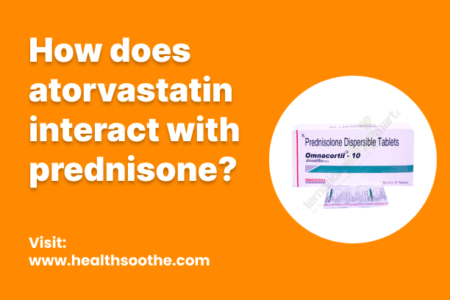Metformin is employed alongside a balanced diet and exercise regimen, and sometimes in combination with other medications, to manage elevated blood sugar levels. It is primarily utilized in patients diagnosed with type 2 diabetes. The regulation of high blood sugar aids in averting complications such as kidney damage, vision impairment, nerve disorders, limb amputation, and sexual function impairments. Effective management of diabetes can also lower the risk of experiencing a heart attack or stroke.
The mechanism of action of metformin involves facilitating the restoration of your body's natural response to insulin. Additionally, it reduces the production of sugar by your liver and the absorption of sugar by your stomach and intestines.
Prednisone
Prednisone is utilized in the treatment of various conditions like arthritis, blood disorders, respiratory issues, severe allergies, skin ailments, cancer, eye complications, and immune system disorders. Belonging to the corticosteroid class of drugs, prednisone works by reducing the immune system's response to different diseases, thereby alleviating symptoms such as inflammation and allergic reactions.
How to use prednisone
Follow your doctor's instructions when taking this medication orally with food or milk to avoid stomach irritation. If using the tablet form, take it with a full glass of water unless otherwise directed by your doctor. When using the liquid form, measure the dose precisely using a specialized measuring device, not a household spoon. If instructed to take only one dose daily, do so in the morning before 9 A.M.
Adhere strictly to your doctor's directions regarding dosage and schedule. The duration of treatment and dosage depend on your medical condition and response to the medication. If taking this medication on a non-daily schedule (e.g., every other day), consider marking your calendar for reminders.
Do not discontinue this medication abruptly without consulting your doctor, as some conditions may worsen with sudden cessation. Possible symptoms upon discontinuation include weakness, weight loss, nausea, muscle pain, headache, tiredness, and dizziness. Your doctor may recommend tapering the dose gradually to minimize these effects. Inform your doctor or pharmacist of any new or worsening symptoms promptly.
Keep your doctor informed if your condition persists or deteriorates.
Read Also: Can I Use Medicare at Urgent Care Centers?
Pros and Cons of metformin and prednisone
Metformin:
Pros:
- Effective Blood Sugar Control
- Cardiovascular Benefits
- Weight Management
- Low Risk of Hypoglycemia
Cons:
- Gastrointestinal Side Effects
- Lactic Acidosis Risk
- Kidney Function Monitoring
Prednisone
Pros
- Anti-Inflammatory Properties
- Immunosuppressive Actions
- Fast-Acting Relief
Cons:
- Glucose Metabolism Effects
- Long-Term Side Effect
- Withdrawal Symptoms
Differences Between metformin and prednisone
Metformin:
Metformin is primarily used to treat type 2 diabetes mellitus. It is often prescribed as a first-line medication to lower blood sugar levels and improve insulin sensitivity.
Prednisone:
Prednisone has a broad range of indications, including inflammatory conditions such as rheumatoid arthritis, asthma, inflammatory bowel disease, skin disorders like eczema and psoriasis, autoimmune diseases, certain cancers, and allergic reactions. It is also used in organ transplant recipients to prevent rejection.
Alternative to metformin and prednisone
Alternative to Metformin:
Insulin Therapy:
In cases where oral medications are not sufficient to control blood sugar levels, insulin therapy may be considered as an alternative or adjunct to metformin. Different types of insulin (rapid-acting, short-acting, intermediate-acting, long-acting) can be used based on individual needs.
Alternative to Prednisone:
Nonsteroidal Anti-Inflammatory Drugs (NSAIDs):
For inflammatory conditions such as arthritis, NSAIDs like ibuprofen, naproxen, diclofenac, or celecoxib may be considered as alternatives to corticosteroids, especially for short-term pain relief and inflammation control.
Interactions between your drugs
prednisone metformin
Monitoring is crucial as certain medications can reduce the effectiveness of insulin and other antidiabetic agents. These medications include atypical antipsychotics, corticosteroids, diuretics, estrogens, gonadotropin-releasing hormone agonists, human growth hormone, phenothiazines, progestins, protease inhibitors, sympathomimetic amines, thyroid hormones, L-asparaginase, alpelisib, copanlisib, danazol, diazoxide, isoniazid, megestrol, omacetaxine, phenytoin, sirolimus, tagraxofusp, temsirolimus, as well as high doses of nicotinic acid and adrenocorticotropic agents. These medications can lead to hyperglycemia, glucose intolerance, new-onset diabetes mellitus, or worsening of preexisting diabetes.
To manage this, caution should be exercised when prescribing medications that affect glucose metabolism to diabetic patients. Close monitoring of blood sugar levels is recommended after starting or stopping these medications, and adjustments to the dosages of concurrent antidiabetic drugs may be necessary. Patients should be advised to inform their doctor if they consistently have high blood sugar levels or experience symptoms such as excessive thirst and increased urination frequency or volume, which could indicate severe hyperglycemia. Additionally, patients should be monitored for hypoglycemia when these medications are stopped as part of their treatment regimen.
Drug and food interactions
metformin food
It is generally recommended to avoid alcohol while taking metformin due to its potential to enhance the drug's impact on lactate metabolism, increasing the risk of lactic acidosis. Alcohol consumption can also lead to hypoglycemia or hyperglycemia in individuals with diabetes. Although hypoglycemia is rare with metformin alone, alcohol intake can elevate this risk, especially when consumed on an empty stomach or after exercise. Alcohol inhibits gluconeogenesis and the body's response to low blood sugar, resulting in prolonged episodes of hypoglycemia lasting up to 8 to 12 hours after consumption. Chronic alcohol misuse can also lead to impaired glucose tolerance and hyperglycemia. However, moderate alcohol consumption typically doesn't affect blood glucose levels significantly in well-controlled diabetic patients.
Food can affect the absorption of metformin, depending on whether it's an immediate-release or extended-release formulation. When immediate-release metformin (850 mg) is taken with food, peak plasma concentration (Cmax) and overall exposure (AUC) decrease by about 40% and 25%, respectively, with delayed time to peak plasma concentration (Tmax). In contrast, extended-release metformin taken with food increases AUC by 50% without affecting Cmax or Tmax, regardless of the meal's fat content. These findings may not apply to metformin formulations combined with other oral antidiabetic drugs.
To manage these interactions:
- Take metformin with meals.
- Avoid excessive alcohol consumption during treatment.
- Diabetic patients should avoid alcohol if their blood glucose is poorly controlled or if they have specific conditions like hypertriglyceridemia, neuropathy, or pancreatitis.
- Avoid alcohol on an empty stomach or after exercise to prevent hypoglycemia risk.
- Contact your doctor immediately if you experience symptoms suggestive of lactic acidosis, such as malaise, muscle pain, respiratory distress, increased drowsiness, or abdominal discomfort, especially after stabilizing metformin therapy.
- Promptly discontinue metformin if lactic acidosis is suspected. Diagnostic tests like electrolyte levels, ketones, blood glucose, blood pH, lactate levels, and metformin levels can aid in confirming the diagnosis. Lactic acidosis should be considered in diabetic patients presenting with metabolic acidosis without evidence of ketoacidosis (ketone presence in urine and blood).
Conclusion
The interaction between metformin and prednisone is a topic of interest due to their potential impact on glucose metabolism and overall treatment efficacy. Metformin, a widely used medication for diabetes management, works by improving insulin sensitivity and reducing hepatic glucose production. On the other hand, prednisone, a corticosteroid, is often prescribed to manage various inflammatory and immune system-related conditions.
The key consideration in understanding how these medications interact lies in their effects on blood glucose levels. Metformin helps regulate blood sugar levels, while prednisone, especially at higher doses or with prolonged use, can lead to hyperglycemia or exacerbate existing diabetes. This interaction underscores the importance of close monitoring when these drugs are used concomitantly.
When metformin is combined with prednisone, healthcare providers typically monitor blood glucose levels more closely to ensure optimal diabetes management. Adjustments in medication dosages or additional interventions may be necessary to maintain stable blood sugar levels and prevent complications such as hyperglycemia or hypoglycemia.
In conclusion, the interaction between metformin and prednisone underscores the need for vigilant monitoring and individualized management strategies to achieve optimal therapeutic outcomes while minimizing the risk of adverse effects on glucose metabolism in patients with diabetes or those at risk of developing glucose-related complications.



